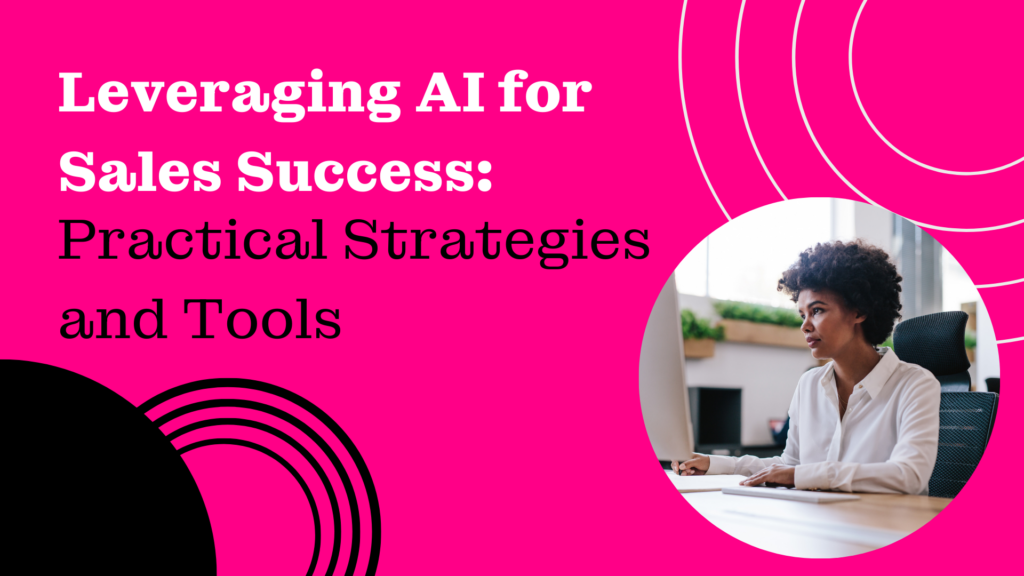Sustainable Success: How to Build a Sales Career That Evolves With You

Sales is often framed as a sprint. Hit the numbers. Push through the pressure. Grind hard, rest later. But here’s the truth: That model burns people out, especially women of color who are navigating both professional and cultural pressures in high-performance environments. Your sales career deserves more than a burnout cycle. It deserves strategy, sustainability, and space to evolve as you do. This is not just a job. This is a career. And a sustainable career means doing work that energizes you, builds your skills over time, and aligns with the life you’re creating—not just the goals you’re chasing. Be Productive, Not Overextended Productivity isn’t about packing your calendar or always being available. It’s about staying focused on what actually moves the needle and letting go of the noise. You don’t need to earn your value through exhaustion. The constant hustle, the back-to-back calls, the late-night follow-ups? Those are signs of misalignment, not ambition. You are allowed to pause, recalibrate, and redefine what a productive day looks like for you. Start here: Time-block your most focused hours for strategic work, not just calls or meetings Schedule your priorities, not just your tasks Let AI or automation help you streamline follow-ups and reporting Protect time for thinking, planning, and rest—because clarity requires space Productivity should support your well-being, not compete with it. When you manage your energy with intention, you do more of what matters and less of what drains you. Think Long-Term: Redefining Sales Success You didn’t come this far to burn out halfway through. Sales is intense, but it can also be a long, rewarding journey if you build it on your terms. Sustainable success means designing a career that grows with you, not one that demands you shrink to fit it. That might mean stepping into leadership, shifting into a new industry, taking a sabbatical, or pivoting into a role that aligns better with your values. Sustainability looks like: Taking real time off and honoring it without guilt Having honest conversations about your bandwidth Seeking sponsors who advocate for your growth and protect your potential Allowing your goals to evolve as your life evolves Your ambition does not expire when your priorities shift. It sharpens. It becomes more intentional. You are allowed to change your mind. You are allowed to grow. You are allowed to define success in ways that reflect who you are now—not just who you were when you started. Your Career Should Honor Your Life, Not Override It Sales should not come at the cost of your peace, your health, or your identity. The job is important, but so is your joy. So is your family. So is your rest. A career worth having is one that creates room for your wholeness—not just your performance. You are not here to prove yourself endlessly. You are here to build something that lasts. That might mean logging off when you said you would. Saying no to work that doesn’t align with your values. Making time for the things that recharge you. Or redefining your goals to reflect what success actually feels like, not just what it looks like from the outside. This is not a sprint. It’s a rhythm. One that adjusts to you, not the other way around. Ready to Grow With Us? You’re building a career that reflects your vision, not just your role. And that takes community, clarity, and care. At Sistas in Sales, we believe you should not have to choose between performance and peace. We offer the space, resources, and sisterhood to help you grow your sales career in a way that is strategic, sustainable, and aligned with who you are. Join us at the Sistas in Sales Summit 2025. This is where goals meet grounding. Where growth feels personal and collective. Where women of color in sales come together to connect, learn, and lead with power and purpose. Build a career that honors all of you. We’ll meet you there.
Mastering Modern Sales: Leveraging AI and Building a Personal Brand

How Women of Color in Sales Can Use Technology and Authenticity to Lead the Future Let’s be real: the way people buy has changed. We’re in a remote-first, digital-forward world where buyers do their research long before they ever speak to a rep. Attention spans are shorter. Expectations are higher. And trust? It’s harder to earn. Enter automation, AI-powered CRMs, predictive insights, and data-driven strategies. These tools aren’t just for techies—they’re for any sales professional who wants to close smarter, connect faster, and stay in tune with today’s buyers. If you’re a mid-to-senior-level saleswoman, embracing these changes isn’t optional—it’s essential. The good news? You don’t need to be an AI expert. You just need to be intentional, curious, and open to learning what can elevate your workflow. AI and personal branding are no longer “nice-to-haves”—they’re your edge. Together, they help you sell with more precision and more power. And for women of color in sales, they offer a real opportunity to lead the future by showing up smarter, louder, and more authentically than ever before. Leveraging AI in Sales Without Losing Your Voice The fear is real—“Will AI replace me?” The truth? It won’t replace you. But it will elevate the sales pros who know how to use it wisely. AI doesn’t need to take over your process to be powerful. When integrated intentionally, it becomes a behind-the-scenes partner—helping you move faster, make smarter decisions, and spend more time doing what actually drives results: building human connections. Here’s how AI can support your sales process while keeping your voice and values front and center: Predictive analytics can alert you when a lead is likely to convert—so you’re always one step ahead. No more chasing cold leads while your hot prospects go cold. Automated lead scoring and email personalization help you focus your energy where it counts. AI sorts through the noise so you can act with confidence and speed. ChatGPT and similar tools are game-changers for writing follow-ups, prepping for discovery calls, handling objections, or even brainstorming your next LinkedIn post. They give you a strong starting point—you add the heart. CRM integrations with AI can log call notes, track engagement, and keep your pipeline organized without manual input—giving you more time to strategize, not scramble. But remember: tech is the tool—you are the strategy. AI can’t replicate your lived experience, your cultural fluency, or your ability to read the room. It can’t replace the energy you bring to a deal, the trust you build in a conversation, or the gut instinct you’ve honed over years in the field. What it can do is clear the clutter—so you can lead with clarity and impact. Start Here: Beginner-Friendly Tools to Explore ChatGPT: Draft outreach emails, prep for sales calls, brainstorm messaging, and handle objection scenarios Lavender.ai : Get instant feedback on your email tone, clarity, and effectiveness HubSpot or Salesforce Einstein: Prioritize leads, forecast pipeline performance, and track buyer behavior with real-time insights Notion AI or Grammarly: Streamline internal communications, clean up proposals, and polish follow-ups These tools can help streamline your workflow—but what truly sets you apart in modern sales is how you show up. Technology may support the process, but your personal brand drives the connection. Building a Personal Brand That Sells In today’s sales landscape, your expertise isn’t the only thing buyers are paying attention to—they’re also paying attention to you. Your voice, your values, and how you show up in the world directly impact your credibility and influence. That’s why personal branding isn’t just a nice-to-have—it’s your edge. It’s how you move from being a name on a sales call to a trusted thought partner. And for women of color in sales, it’s also a way to claim space in an industry where your voice has long been underestimated or overlooked. So what does building a personal brand really mean—and how do you do it without feeling like you’re “performing” online? Define Your Voice Start with clarity: What do you want to be known for? Is it your negotiation skills? Your ability to turn cold leads into long-term clients? Your passion for helping Black women thrive in tech? Identify the intersections of your values, experience, and ambition—and let those guide your content and conversations. Action Step: Jot down 3 themes or values you want your name to be associated with. That’s the foundation of your brand. Own Your Wins Loudly and Boldly This is not the time to be humble. Share your success stories—big and small. Celebrate closed deals, promotions, hard lessons, and milestones. Give people a window into the journey behind your results. When you share your wins with honesty and pride, you don’t just build credibility—you build relatability and trust. Action Step: Start your next LinkedIn post with: “Here’s what no one tells you about closing a six-figure deal…” Show Up Where It Counts Visibility builds credibility. You don’t need to be everywhere—you just need to be intentional. Whether it’s sharing insights on LinkedIn, mentoring a rising saleswoman, or speaking at events, consistent visibility signals leadership. Action Steps: Comment thoughtfully on industry posts Share a weekly win or insight from your role Say yes to the panel, the podcast, or the coffee chat Every touchpoint shapes your brand. Make Content from Real Life Think you have nothing to say? You do. Your day-to-day experiences—overcoming objections, navigating team dynamics, pitching under pressure—are content gold. You don’t need polished scripts. You need perspective. Speak from where you are, not just where you want to be. Reminder: Your lived experience is not a side note—it’s the story. Action Step: Pick one moment from your week that made you pause—something you learned, overcame, or noticed in a client conversation. Turn that into a quick LinkedIn post or voice memo. The realness is what makes it resonate. Keep It Sustainable Don’t burn yourself out trying to brand yourself perfectly. Start small. Post once a week. Set aside 30 minutes on Fridays to reflect on what you learned and share
Understanding Macroeconomic Trends and their Sales Impacts

Sales is a complex world, and in order to succeed at it, navigating sales as a discipline requires much more than just persuasive skills and product knowledge. It involves understanding the broader economic environment that influences buyer behavior and market dynamics. Macroeconomic trends, such as GDP growth, unemployment rates, and inflation, shape the economic landscape, directly impacting sales strategies and outcomes. For women of color in sales and sales-adjacent roles, staying informed about these trends is not just beneficial—it’s essential for maintaining a competitive edge and adapting to ever-changing market conditions. What are Macroeconomic Trends? Macroeconomic trends refer to the overarching economic factors that impact the economy on a national or global scale. Key indicators include: GDP Growth: Measures the economic performance of a country. Strong GDP growth typically signals a healthy economy, increasing consumer spending and sales opportunities. (Here are the most recent GDP growth numbers for all major countries worldwide where salespeople may do business.) Unemployment Rates: High unemployment can lead to decreased consumer spending, affecting sales. Conversely, low unemployment often boosts consumer confidence and purchasing power. (Unemployment rates as of April 2024 for all major countries globally) Inflation: Rising prices can erode consumer purchasing power, impacting sales. However, moderate inflation can indicate a growing economy. (Current inflation rates by country) Monitoring these indicators helps sales professionals anticipate market shifts and adjust their strategies accordingly. The Rise of AI and Automation as a Macroeconomic Trend One of the most significant macroeconomic trends today is the rapid advancement of artificial intelligence (AI), automation, and machine learning. These technologies are transforming industries, including sales, on a global scale: AI in Sales: AI is transforming sales processes by providing predictive analytics, customer insights, and sales forecasting. Tools like SIS Summit 2024 Sponsor Apollo.io, or other sales-related AI tools like chatbots, virtual assistants, and AI-driven CRMs enhance customer interactions and streamline sales workflows. Automation and Machine Learning: Sales automation tools are becoming increasingly sophisticated, automating routine tasks such as lead scoring, email marketing, and follow-ups. This allows sales teams to focus on building relationships and closing deals. Machine learning algorithms are improving the accuracy of sales forecasts and personalizing customer interactions. Impact on Employment: The rise of AI and automation has led to significant shifts in skill requirements and has contributed to major layoffs in various sectors. For example, Intuit recently laid off 1,800 employees as part of their AI transformation strategy, underscoring the broader industry trend of workforce reduction due to technological advancements. Companies like Salesforce and HubSpot are leveraging AI to enhance their CRM capabilities, offering features such as predictive lead scoring and automated customer segmentation. The Impact of Economic Shifts on Sales Economic shifts, such as major layoffs and market volatility, have significant implications for sales: Layoffs and Workforce Changes: Recent trends have seen major layoffs in the tech and other sectors, leading to a shift in consumer behavior and spending patterns. Sales professionals need to be agile, focusing on high-value clients and diversifying their customer base. Action: Start building a more diverse client portfolio now to reduce dependency on any single industry. Invest in continuous learning to stay adaptable and update your skills regularly to remain relevant in a changing job market. Market Uncertainty: Economic uncertainty often results in cautious consumer spending. Sales strategies should emphasize value and cost-effectiveness, highlighting how products or services can solve immediate problems or provide long-term benefits. Action: Develop value-focused sales pitches and create case studies that demonstrate cost savings or ROI. Stay close to existing clients to understand their evolving needs and offer solutions that fit their current budget constraints. Adaptation Strategies: To navigate these challenges, sales teams should invest in training, embrace new technologies, and remain flexible in their approaches. Building a strong personal brand and leveraging a robust network can also provide stability and open new opportunities. Action: Enroll in professional development courses, particularly those focused on emerging sales technologies. Use social media to build your personal brand and actively engage with your professional network to discover new opportunities and share knowledge. Major Business Trends Changing the Sales Landscape Several business trends are reshaping the sales industry: Remote Work: The rise of remote work has transformed sales operations. Virtual meetings and digital communication tools are now essential for connecting with clients and colleagues. Action: Invest in reliable digital communication tools and set up a dedicated workspace to enhance productivity. Master virtual selling techniques by attending webinars or training sessions on how to effectively engage clients online. E-commerce Growth: The shift towards e-commerce has accelerated, requiring sales teams to adapt to digital sales channels. Understanding online consumer behavior and optimizing digital marketing strategies are critical. Action: Learn about e-commerce platforms and how they can be integrated into your sales strategy. Collaborate with your marketing team to develop targeted online campaigns that drive traffic and convert leads into sales. Customer Expectations: Modern customers expect personalized and seamless experiences. Sales professionals must leverage data to understand customer needs and tailor their approaches. Action: Utilize CRM systems to track customer interactions and preferences. Personalize your outreach by using data analytics to identify customer pain points and tailor your solutions accordingly. Globalization: As businesses expand globally, sales teams must navigate different cultural norms and market dynamics. This requires a nuanced understanding of international markets and localized strategies. Action: Educate yourself on the cultural and economic nuances of the regions you are targeting. Develop localized sales strategies that respect cultural differences and meet the specific needs of each market. Preparing for Future Trends To stay ahead, sales professionals should focus on continuous learning and proactive adaptation: Continuous Learning: Keep up with industry trends, attend webinars, and participate in training programs to stay informed and develop new skills. Subscribe to industry newsletters, follow thought leaders on social media, and join professional organizations that offer educational resources (like SIS!) Networking and Collaboration: Engage with industry peers, join professional groups, and participate in networking events. Building a strong professional network provides support and opens up new opportunities. Attend
Leveraging AI for Sales Success: Practical Strategies & Tools

AI and natural language models are experiencing exponential growth, disrupting nearly every industry worldwide. This rapid advancement in technology has immense potential to revolutionize sales departments and individual sales professionals’ daily work. AI can give saleswomen a competitive edge, streamline processes, and enhance productivity. Artificial Intelligence (AI) is revolutionizing the sales industry, offering powerful tools and strategies to enhance efficiency, personalize customer interactions, and drive better outcomes. Understanding and leveraging AI for sales can significantly impact success, making it a critical component of modern strategies. Understanding AI for Sales AI in sales involves using machine learning algorithms and data analysis to optimize various aspects of the sales process. This technology can streamline tasks, provide valuable customer insights, and predict future sales trends, ultimately driving increased efficiency and effectiveness. The benefits of AI for sales include improved lead generation, enhanced customer personalization, and accurate sales forecasting. Practical Strategies for Leveraging AI for Sales Strategy 1: AI for Lead Generation AI can identify and prioritize leads more effectively than traditional methods. By analyzing vast amounts of data, AI tools can pinpoint potential customers who are most likely to convert, saving time and resources. Popular tools for AI-driven lead generation include Microsoft Co-Pilot, Salesforce Einstein, HubSpot, Apollo.io and Marketo. These tools utilize predictive analytics to score leads, ensuring sales teams focus on the most promising opportunities. Strategy 2: AI for Sales Forecasting Accurate sales forecasting is essential for planning and strategy. AI can predict sales trends and outcomes by analyzing historical data and market conditions. Tools like Aviso, Clari, and Anaplan provide predictive insights that help sales leaders make informed decisions, allocate resources efficiently, and set realistic targets. Strategy 3: AI for Customer Insights and Personalization Personalizing customer interactions is crucial for building strong relationships and driving sales. AI can analyze customer behavior and preferences, allowing sales teams to tailor their pitches and communications. Top AI Tools for Sales Leaders CRM Systems with AI Capabilities AI-enhanced Customer Relationship Management (CRM) systems offer numerous benefits, including automated data entry, lead scoring, and personalized communication. Examples include Salesforce Einstein and Zoho CRM, which integrate AI to provide actionable insights and streamline sales processes. AI-Powered Sales Assistants AI-powered sales assistants can automate repetitive tasks, allowing sales professionals to focus on high-value activities. Tools like Clara and Conversica handle tasks such as scheduling meetings and following up with leads, improving efficiency and productivity. AI for Sales Analytics Data-driven decision-making is critical for sales success. AI tools like Gong.io and Chorus.ai analyze sales calls and interactions, providing insights into customer sentiments, objections, and preferences. These insights help sales teams refine their strategies and improve their performance. Implementing AI for Sales Success Integrating AI tools into existing sales workflows involves several steps. First, identify the areas where AI can have the most significant impact, such as lead generation or sales forecasting. Next, select the appropriate tools and ensure that the sales team receives adequate training and support. Finally, measure the impact of AI on sales performance to refine and optimize its use continually. Building a strong AI-driven sales strategy can transform the sales process, driving better outcomes and increasing efficiency. By understanding and leveraging AI for sales, professionals can stay ahead of the competition and achieve greater success. Learn much more about how to use AI at the 7th Annual SIS Summit, coming up in September. Buy your ticket while they’re still available!

